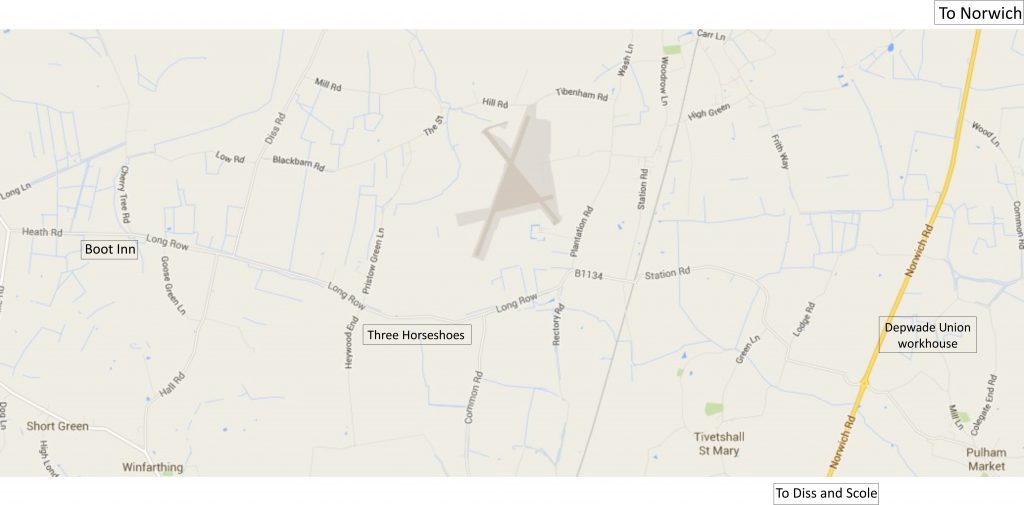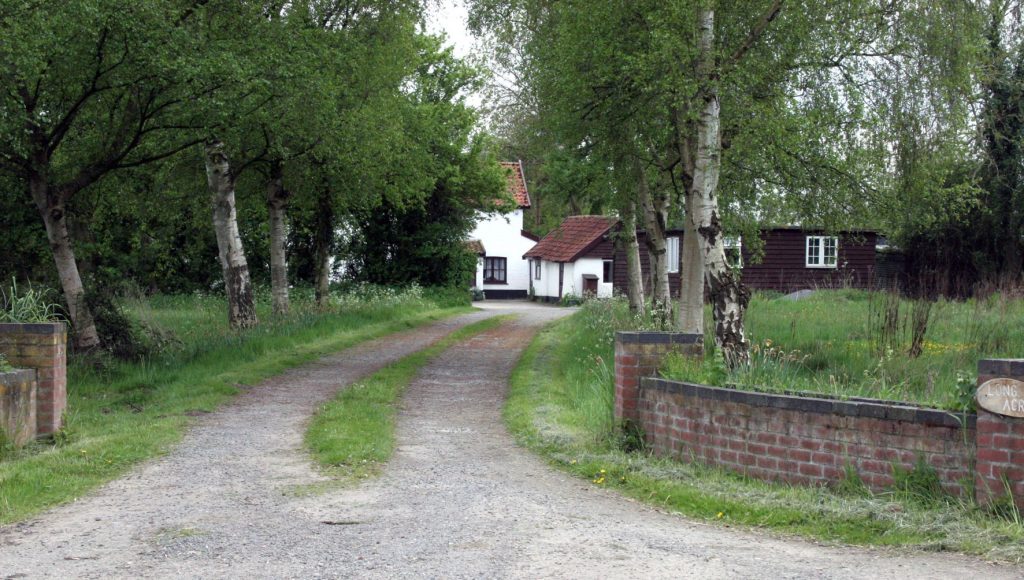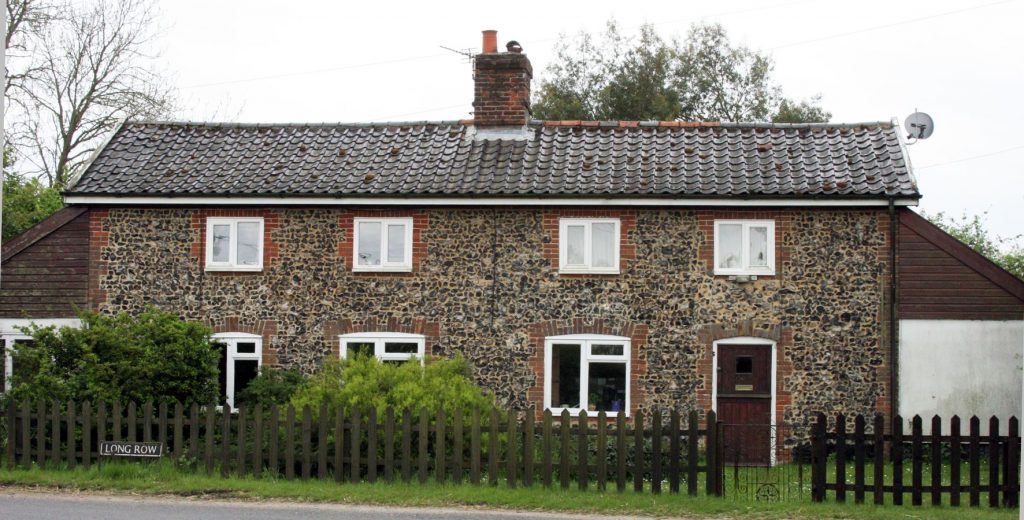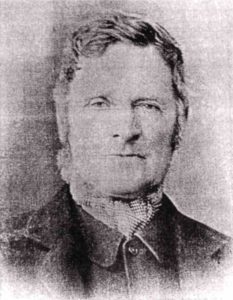Folk songs collected around Diss, Norfolk, in 1911 by Ralph Vaughan Williams and George Butterworth
Foreword
This article traces a visit by composers Ralph Vaughan Williams and George Butterworth to the Diss area in south Norfolk and identifies the singers and locations. Links to the Vaughan Williams Memorial Library online archive are given for each song.
This article supersedes my earlier writing on the EATMT website as it includes more information about George Butterworth, due to my involvement in the film “All My Life’s Buried Here’ by Hajdukino Productions, released in January 2019. It is now available on DVD and can be bought by following the link.
Anyone wishing to cite this original research should credit it to Katie Howson and cite this website as the source. © Katie Howson 2021
Introduction
In the early twentieth century, there was huge interest amongst English composers and art musicians in the traditional folk songs still being sung in the countryside. However, unlike today, when we can easily access huge online repositories of folk tunes and lyrics, the composers of Edwardian times had little material to draw on and so many went out on field trips to find and note down ancient melodies from the older generation of farmhands, fishermen, washerwomen, innkeepers and domestic servants. The most famous of these composers was Ralph Vaughan Williams, who, in 1903 collected his first folk song from Charles Potiphar at Ingrave, near Brentwood in Essex. During the following decade, he collected nearly 800 folksongs, the vast majority noted down with pencil and paper whilst listening to the singers. The influence of the melodies he heard shaped many of his compositions such as the Norfolk Rhapsodies (1906), Fantasia on English Folk Songs (1910) and Lark Ascending (1920).
Vaughan Williams’ first folksong collecting trip was at the invitation of Georgiana and Florence Heatley, daughters of the Reverend Henry Davis Heatley of Ingrave in Essex. In subsequent years he revisited this area and began to investigate, through a circle of like-minded friends and contacts, singers and songs in many areas of England. He returned to East Anglia on a number of occasions, collecting songs in north Norfolk, Cambridgeshire and south Suffolk. In 1908 he and George Butterworth teamed up for a successful song collecting trip in the Norfolk Broads and this was followed by further trips together to the Suffolk coast and south Norfolk in 1911. Butterworth himself often worked in partnership with other song collectors including Francis Jekyll (nephew of the garden designer Gertrude Jekyll) and the two of them had made many trips to Sussex together from 1906 onwards, on the trail of old folk songs. Butterworth was also a fine dancer and collected Morris dances along with Cecil Sharp. He was killed during the Battle of the Somme at a young age, but works such as The Banks of Green Willow (1913) show what a talented composer he was.
The trip to south Norfolk, December 1911
From the standpoint of the early twenty first century, we could wish that the Edwardian song collectors had taken a more sociological, or even anthropological approach, as they rarely gave details beyond the singer’s name and location. Vaughan Williams notes simply mention that the workhouse, pubs and homes he visited in December 1911 were ‘near Diss‘ – a small market town halfway between the two big regional centres of Norwich and Ipswich. Fortunately George Butterworth made a few more notes on the music transcriptions he made and they have proved invaluable to this research. The actual locations turn out to be well outside of Diss itself, and the two men were there for three days, 19th, 20th and 21st December 1911. We do not know what brought them to the area in the first place, most likely a local antiquarian or folk music enthusiast became aware of some of the singers and invited the two – by then well-known – folksong collectors to visit and investigate further. It’s quite likely that they came by train from London with their bicycles – there is a great story from one of their visits to the Broads about them accepting a lift (with bikes) on a small boat across a Broad late at night and the boatman losing his sense of direction!
On Tuesday 19th December 1911, they made three stops: the workhouse (Pulham Union, about five miles north of Diss); a pub called The Horseshoes between the villages of Gissing and Tibenham; and also met some other singers – ‘near Diss’.
On the second day they visited two other men in the workhouse who had songs and then went on to two pubs: an unnamed inn in Tibenham – probably the Boot Inn in Long Row – and the Scole Greyhound.
On their last day they revisited the Horseshoes and then left the area, travelling onto Southwold on the Suffolk coast to revisit a singer they had met the previous year, William Hurr. You can read the latest about the Southwold singers on this website.
Vaughan Williams commented on the songs collected during this trip: “5 first-rate; 9 good; 5 moderate; 5 passable.”

The singers and the songs
Having carried out extensive genealogical research, I have now positively identified virtually all the singers from this 1911 trip to south Norfolk, some of whom were named only by their surname in the song collector’s notes. If anyone has any further information or photographs, I would be very pleased to hear from them – just drop me an email.
A selection of the songs collected on this trip were amongst those published in ‘The Penguin Book of Folk Songs’ in 1959. Sixty years on, we are in the privileged position to be able to look directly at song collectors’ notes and transcriptions from the comfort of our own homes, as these have all been digitised through the English Folk Dance and Song Society’s project The Full English and are available online at the Vaughan Williams Memorial Library Online website.
Most songs were actually written down by both Vaughan Williams and Butterworth, but we have tried to choose the clearer or more comprehensive version to link to. The song title links will take you directly to scans of the original notes: (RVW) after the song tile indicates that the transcription was made by Vaughan Williams and (GB) indicates that it was made by George Butterworth.
Tibenham and Gissing

Noah Fisher (1849-1940)
Two songs were noted down from Noah in The Horseshoes. Noah was a farm worker who lived on Long Row all his life. He probably worked for Henry Brewster at Waterloo Place, a small farming hamlet of about ten households in the late nineteenth century (and now a luxury “retreat”!). Local newspapers reveal a few details: in 1881 he was found guilty of possessing a gun without a licence – there were clearly suspicions that he used it for poaching, but he said he had tried to use it for killing rats but it hadn’t worked. He was fined £1 or 14 days’ hard labour – we don’t know which option he took. In 1882, perhaps a bit more wary of the long arm of the law, he placed an advertisement in the Diss Express, stating that he had found a stray black retriever dog. By 1900 he was definitely on the ‘straight and narrow’ as he won a ploughing match in nearby Winfarthing, with a prize of a copper kettle and 3s 9d.
In the light of these very few details about his life, the selection of songs noted down from his is remarkably poignant: The Poacher (Hares in the Old Plantation) (RVW) and The Team Boy (GB). Noah’s words to this song are so very appropriate to his own life:
When I was a teamboy I drove a fine team,
I took great delight in keeping them clean.
I rubbed them, I scrubbed them, I lay them down to rest.
I always was thinking the right way was best.
I’m keeping them clean boys, to show in good colour,
I’m gaining a character of being a good fellow.
‘Blue’ (James) Fisher (1835-1912)
By process of elimination, this must have been Noah’s older brother James Fisher. He was also a farmworker, who was born at Waterloo Place and lived his entire life there, working on farms in the neighbourhood. Censuses show the number of men employed on the Waterloo Farms diminishing through the late nineteenth century, and evidently James had to travel a little bit further to work sometimes: his only appearance in the local press is regarding a dispute with his then employer, Robert Mullenger who farmed about a mile to the south, on the edge of Burston. The dispute hinged on whether the contract was a weekly one or a casual one and Mullenger was particularly annoyed because James Fisher had left him in the lurch at Harvest time.
He sang Bonny Robin (GB), Jockey to the Fair (GB) and The Horse Race Song (GB), in the Horseshoes. Some of these songs were published in 1977 in the E.F.D.S.S. publication ‘Ploughboy’s Glory’, edited by Michael Dawney.
Harry Last (1861-1934)
Harry Last grew up in the Heywood area of Diss, where he kept the Rampant Horse pub from about 1896 until he took over as landlord of the Gissing Three Horseshoes in late 1911. Vaughan Williams and Butterworth noted down Sweet Primeroses (RVW) from him in the Horseshoes itself, where Noah and Blue sang, and one of these men, or possibly someone else, also sang The Barley Mow (GB) – a song almost always sung in a pub, for obvious reasons! The words noted down by Vaughan Williams and Butterworth are a slightly quirky take on the usual set. The song is cumulative, the entire last verse is given here:
We’ll all drink out of a barrel, my boys, a barrel my boys, a barrel my boys,
A barrel, a half-barrel, a gallon, a half-gallon, a quart, a pint, a half-pint, a stable pail and the brown bowl.
We’ll drink success to the mulberry bush, success to the Barley Mow.
Mr Woods (Isaac or Ephraim)
Only George Butterworth even wrote down a surname for the man who sang The Keys of Heaven (GB) in a pub in Tibenham on the first evening of their visit; the same man may also have sung The Yorkshire Bite (RVW). The singer must have been one of two brothers – either Isaac (1853-1928) or Ephraim (1860-1923) Woods. They were both farm workers who grew up in Wymondham but were living in Tibenham in 1911. Isaac lived next door but one to the Boot Inn – so the ‘pub’ may possibly have been the Boot, or the Horseshoes where the song-collectors went on subsequent days.

‘Mr Tuffs’, senior and junior:
William J Tufts (1828-1912) and his son William (1856-1929)

Another pair of singers who proved tricky to identify. Vaughan Williams’ notes only said they were from ‘near Diss’. We now know that they were William J. Tufts (1828-1912) and his son William (1856-1929). Mr Tufts senior was a farmer and poultry dealer in Long Row, and in 1911 he was widowed, aged 82, and his unmarried son aged 55 was living with him. Vaughan Williams’ visit seems to have been to their home rather than in a pub, possibly because the two men were farmers rather than farmworkers and maybe for that or other reasons, did not frequent the pub. An interesting aside, is that four of William senior’s brothers emigrated to Ontario in Canada where they founded a settlement known as Tuftsville.
William Tufts senior sang Trot Away (GB), The Ratcatcher’s Daughter (GB) and Hearts of Oak (GB) and his son sang The Miller and his Three Sons (RVW) and Old King Cole (GB).
The workhouse
Vaughan Williams and Butterworth also made two visits to the local workhouse, an imposing building standing right on the main Ipswich to Norwich road, a couple of miles east of Tibenham. The Depwade Union workhouse was built in 1836, following the Poor Law Act of 1834 and doing away with the various small poorhouses in Diss, Gissing, Pulham, Dickleborough and Scole. In 1911, although the old age pension had just been introduced, it was still a place where many elderly and infirm people found themselves when times were hard, and the dread of ending up in the workhouse remained in the folk psyche until the second half of the twentieth century. The Depwade Union is still an austere building, originally designed to hold up to 400 people in four wings. Some of the exterior walls have gone, but the main part of the original building still exists, now divided in to apartments after a spell as ‘Beadle’s Hotel’. The excellent website workhouses.org.uk contains more information.

Jonas Stevenson (1834-1916)
Jonas Stevenson lived and worked all his life in Carleton Rode, north west of Diss. His father kept a small farm and Jonas was a farm worker himself. It seems fair to say that Jonas led a ‘colourful’ life, making regular appearances in the local newspapers under the petty sessions section. In April 1866, he was accused of setting fire to his father’s barn, stables and cartshed. The case came to court in August and was dismissed for lack of evidence; in fact the judge in the original hearing recommended it be dismissed there and then, but it looks as if it may have been a bit of a family vendetta. Other newspaper reports through to 1887 reveal regular fines and short prison sentences for drunk and disorderly behaviour. He was resident in the workhouse by April 1911. He sang John Reilly (GB) and Coming Down to Manchester (Seventeen Come Sunday) (GB).
David Took(e) (1839-1916)
David Tooke was born in Fritton, on the edge of the Broads, but lived in Pulham Market from at least 1871, when he was lodging at the Crown public house. He married quite late in life but sadly, only a few years later he was widowed, and living in the workhouse by April 1911. He sang The Bonny Blue Handkerchief (GB), The Molecatcher (GB) and The Rose of Britain’s Isle (GB).
Jack Dade (1843-1919)
Jack Dade lived in the Wortham / Palgrave are, west of Diss all his life, where he worked on local farms. He was in and out of the workhouse on a number of occasions between 1909 and 1911. An 1898 account from the Diss Express of an entertainment in the workhouse mentions a Mr Dade (who was not an inmate at the time) as a singer – whether or not this was the same man is not known. He sang General Wolfe (GB) and a Harvest Song (GB) to the visiting folksong collectors.
Scole
A little to the south, at a major crossroads in the region, lies the small town of Scole, well known for the large coaching inn the White Hart. A little less well known, but never-the-less a busy pub at the heart of its community at the time, was the Greyhound, where Vaughan Williams and Butterworth called in on 20th December.
John Woodcock(1835-1914)
John Woodcock was landlord of the Greyhound from 1883-1902. He was also a blacksmith and had previously combined the two trades at the Brewer’s Arms in Scole and maybe elsewhere.
He sang Trot Along (RVW) and his son sang The Sowing Machine (GB).
Harry Self (1861-)
A new find in late 2019 – George Butterworth noted down the words to The Sweet Primeroses from a singer called Harry Self in Shelfanger, near Diss, which had been wrongly transcribed on the VWML online archive. Harry Self was a farmworker born in Scole in 1861 and at present nothing is known about the circumstances in which they met him, but it looks as if it might have been as they left south Norfolk and made their way over to Southwold on 23rd December 1911.
Afterword
My research into Vaughan Williams and Butterworth’s folk song collecting in Southwold, on the Suffolk coast in October 1910, has also been updated and is now on this site here and my work on Vaughan Williams’ visit to King’s Lynn in 1905 has been updated in 2021 and is available here. Again, the information on the EATMT site is now superseded by the more recent versions published here.
Here’s that link again to the film and DVD “All My Life’s Buried Here’ by Hajdukino Productions in case you’re inspired enough to want to buy one!
© Katie Howson 2021

